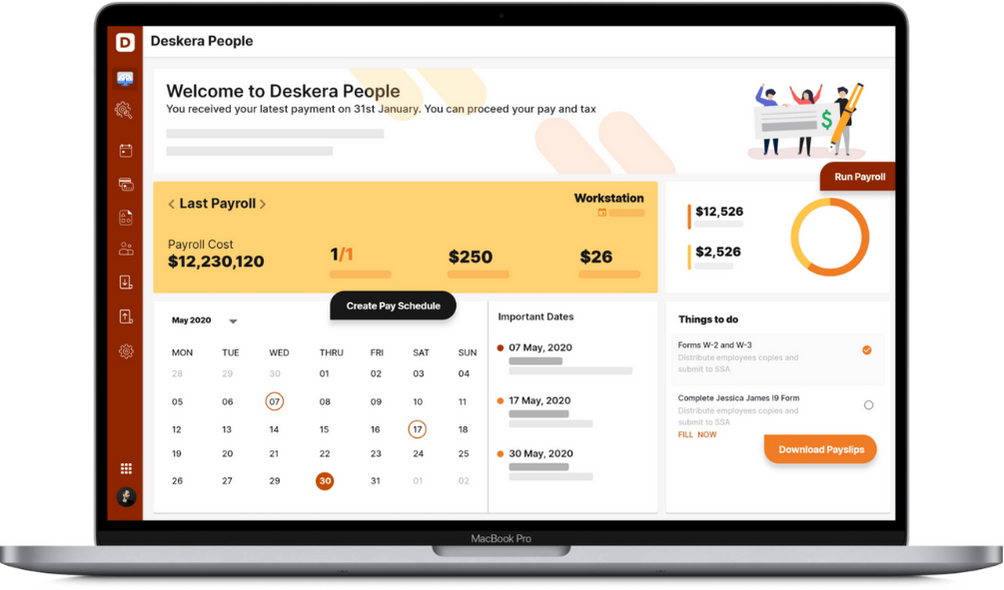When entrepreneurs and small company owners anticipate their firms expanding, becoming more prosperous, and requiring the assistance of more employees, they frequently envision all of the fantastic things that will occur as a result of that expansion. Some of the most exciting aspects of becoming an entrepreneur include creating a corporate culture, boosting earnings, and getting more and more consumers.
Payroll taxes aren't one of the more interesting aspects of the job.
Understanding payroll taxes and then establishing an efficient payroll tax management system may be one of the most difficult aspects of employing your first staff for many small company owners.
Let's look at the basics of payroll taxes and get a fast review of payroll taxes in South Dakota in this post.
Table of Content
- Payroll Taxes: An Introduction
- A Step-by-Step Guide to Run Payroll in South Dakota
- Step 1: Register your company as an employer
- Step 2: Register your company with the South Dakota Department of Commerce
- Step 3: Set up your payroll system
- Step 4: Have staff complete the necessary paperwork
- Step 5: Go over the timesheets and approve them
- Step 6: Calculate each employee's gross salary and taxes
- Step 7: Pay employees their salaries, perks, and taxes
- Step 8: Make a backup of your payroll records
- Step 9: Register with the federal and state governments to file payroll taxes
- Step 10: Finish the year's payroll reports
- Types of Taxes Paid in South Dakota
- How Does a Paycheck Work in South Dakota?
- Key Takeaways
Payroll Taxes: An Introduction
Payroll taxes vary by country, but a simple explanation is that these taxes are levied on either employees or employers (or both!). The amount paid by the employer or the employee is usually calculated as a percentage of the employee's wage.
Payroll taxes come in a variety of shapes and sizes, including:
a. Withholding Taxes
According to Investopedia, “A withholding tax is an amount that an employer withholds from employees' wages and pays directly to the government. The amount withheld is a credit against the income taxes the employee must pay during the year.”
Pay-As-You-Earn (PAYE) Taxes
PAYE taxes are a type of withholding tax that is largely utilised in the United Kingdom and Australia, albeit they are unique in that they are viewed as a kind of payment in advance on the income tax bill due to the end of the year. Employers are often the ones that compute this amount but only with government consent.
Employer-Paid Taxes (FICA)
Some taxes are paid by the company, not the employee, and are dependent on the wage they offer. Social security, Medicare, and other insurance programmes are usually covered by these sums. FICA stands for Federal Insurance Contribution Act, which pays Medicare and Social Security in the United States.
Furthermore, your employee handbook is an excellent tool to communicate with employees about what is required of them, what they may expect from their managers and the firm as a whole, and give changes to corporate policy.
Who Are The Payroll Tax Payers?
Although the company pays certain taxes and the employee pays others, the employee bears the brunt of the cost. This is because businesses frequently reduce wages or salaries to compensate for taxes they are accountable for.
Payroll taxes are not collected in every state. Alaska, Florida, Nevada, South Dakota, Texas, Washington, and Wyoming do not collect payroll taxes from their employees' earnings, whereas New Hampshire and Tennessee only collect income taxes on investment-based earnings.
Let's discuss the Payroll Tax System in South Dakota.
A Step-by-Step Guide to Run Payroll in South Dakota
By typically following federal requirements, South Dakota makes payroll simple for businesses. Attempting to compute South Dakota payroll taxes by hand, on the other hand, might result in expensive mistakes. The following are the fundamental procedures for running payroll in South Dakota.
Step 1: Register your company as an employer
To get a new Federal Employer Identification Number (FEIN), new businesses may need to use the federal Electronic Federal Tax Payment System (EFTPS) (FEIN). To pay federal taxes, you'll need your FEIN.
Step 2: Register your company with the South Dakota Department of Commerce
If your company is brand new, you must register on the Secretary of State's website in South Dakota. Any business that pays workers in South Dakota must register with the state's revenue department.
Step 3: Set up your payroll system
Creating a regular payroll procedure requires deciding how and when to pay employees and tax authorities. You'll also need to figure out how you'll gather employee payroll forms and other records-related paperwork. To assist you with your South Dakota payroll, you may process payroll by hand (not advised), create an Excel payroll template, or use a payroll service.
Step 4: Have staff complete the necessary paperwork
During the onboarding process, every firm that employs workers in South Dakota is required to gather specific forms. On their first day on the job, every employee must undergo I-9 verification. A completed W-4 must also be on file for new workers.
Step 5: Go over the timesheets and approve them
Collect and analyse timesheets from your nonexempt employees many days before payroll is due so you may speak with anyone who could have committed a mistake. Employee time tracking may be done in a variety of methods, some of which are free.
Step 6: Calculate each employee's gross salary and taxes
You'll have to figure out each employee's total salary, deductions, and tax withholdings, among other things. You'll also owe the federal government employment taxes, which must be paid. If you need additional information, look into how to calculate payroll.
Step 7: Pay employees their salaries, perks, and taxes
The majority of businesses now pay all employees via direct deposit. You can, however, use cash or paper checks. The minimum wage in South Dakota is $9.45 per hour, which is more than the federal minimum wage of $7.25 per hour. You may pay your federal and state taxes online in South Dakota. If you utilise a benefits provider, they should collaborate with you to make deductions as straightforward, automated, and electronic as possible.
Step 8: Make a backup of your payroll records
It's a good idea to keep track of your company's financial records. Although there are no rules in South Dakota mandating companies to save employee payments or payroll records, federal law mandates that you keep payroll records for at least three years and payroll tax paperwork for four years.
Step 9: Register with the federal and state governments to file payroll taxes
All South Dakota state taxes must be paid on the due date, which is normally quarterly, to the appropriate state agency, which you may do online at the South Dakota Department of Revenue website. You can pay your federal taxes online using the EFTPS on one of the two schedules shown below:
- Monthly: When the IRS sets you a monthly schedule, you must deposit employment taxes on payments made during that calendar month by the 15th of the next month.
- Semiweekly: When the IRS gives you a semiweekly schedule, you must deposit employment taxes by the following Wednesday for payments made Wednesday, Thursday, and Friday, and by the following Friday for payments made Saturday, Sunday, Monday, and Tuesday.
Please keep in mind that the reporting and depositing of employment taxes are two separate things. Regardless of your payment plan, you must file taxes quarterly on Form 941 or annually on Form 944.
Step 10: Finish the year's payroll reports
Payroll reports are required to be filed every year, including all W-2 and 1099 forms. These forms must be distributed to workers by January 31 of the following year.
Types of Taxes Paid in South Dakota
South Dakota, like most states, has specific taxes that businesses must pay. There are no local taxes or state income taxes in South Dakota.
- Employer Unemployment Taxes
In South Dakota, all companies are required to pay State Unemployment Tax Act (SUTA) taxes. The current pay base is $15,000, with rates ranging between 1.2 and 6.0%. In South Dakota, all new nonconstruction employers will pay a SUTA rate of 1.2% for the first year and 1.0% for the second and third years. In their first year, new construction enterprises pay 6.0%, then 3.0% in years two and three.
2. Workers’ Compensation
Workers' compensation insurance is not required in South Dakota, however, it is strongly recommended. Employees who suffer on-the-job injuries are covered by workers' compensation insurance, which can assist shield them from litigation.
3. Income Taxes
Because there is no state income tax in South Dakota, you must only withhold federal income taxes unless the employee is exempt.
Paycheck Deductions in South Dakota
There is no legislation in South Dakota that prohibits an employer from deducting earnings from an employee's paycheck, nor does it specify what deductions are permitted. Because there is no legislation, you can probably infer that you can deduct wages from an employee's paycheck for the following reasons:
- Money shortages
- Company property that has been damaged, lost or stolen
- Work attire or tools are required.
Please keep in mind that, according to the Department of Labor, a corporation cannot deduct from an employee's salary if doing so would result in the person earning less than the federal minimum wage ($7.25 per hour) for the pay period. However, because South Dakota has a higher minimum wage, you must verify that the employee is paid at least $9.45 per hour.
How Does a Paycheck Work in South Dakota?
FICA and federal income taxes are the sole concerns for employees in South Dakota, as it is one of just seven states without a personal income tax. Because there are no income taxes, you will have extra money throughout the year.
The two components at play when it comes to FICA taxes are Social Security and Medicare taxes. Your portion of Social Security taxes is 6.2% of your earnings each pay period, and your share of Medicare taxes is 1.45%. Because your company matches these payments, the total amount you pay is doubled.
While you usually only pay half of your total FICA taxes, this is not always the case. Because you won't have an employer to match the remaining half of your FICA taxes if you're self-employed in Mount Rushmore State, you'll have to pay all of them alone. If you do pay the entire tax, check into deducting half of the FICA taxes on your tax return (you will need to attach Schedule SE to your 1040).
You'll notice a federal income tax withholding on your South Dakota paycheck every time you are paid. The amount of federal income tax withheld from your paycheck by your employer is primarily determined by the information you supply on the W-4 form. This is why, when you start new employment, you must file a W-4 form. Any changes to your filing status, dependents, or pay should be reflected on a new W-4. Make sure to double-check your withholdings on your Form W-4 if you haven't done so recently.
The IRS has made adjustments to the W-4 form in recent years. The new form does away with allowances and replaces them with a five-step procedure in which filers must disclose any additional income or occupations, as well as other personal details.
South Dakota does not have a state income tax, as previously stated. There are no local income taxes either. As a result, South Dakota is a tax-friendly state. It also has one of the lowest sales taxes in the country, with a base rate of just 4.5%, however, municipalities can levy a general municipal sales tax of up to 2%, as well as a 1% municipal gross receipts tax (MGRT).
A South Dakota financial counsellor can help you understand how taxes fit into your overall financial objectives. Financial experts may also help with investments and financial planning, such as retirement, housing, and insurance, to make sure you're well prepared for tomorrow.
How Can Deskera Assist You?
As a business, you must be diligent with employee leave management. Deskera People allows you to conveniently manage leave, attendance, payroll, and other expenses. Generating payslips for your employees is now easy as the platform also digitizes and automates HR processes.

Key Takeaways
- Payroll taxes are those taxes that are imposed on either employees or employers (or both!).
- Not every state collects payroll taxes, some states are Alaska, Florida, Nevada, South Dakota, Texas, and Washington. These states do not collect payroll taxes from their employees’ income.
- South Dakota, like most states, has specific taxes that businesses must pay. There are no local taxes or state income taxes in South Dakota.
- There is no legislation in South Dakota that prohibits an employer from deducting earnings from an employee's paycheck, nor does it specify what deductions are permitted.
- You'll notice a federal income tax withholding on your South Dakota paycheck every time you are paid.
- South Dakota has one of the lowest sales taxes in the nation
Related Articles












